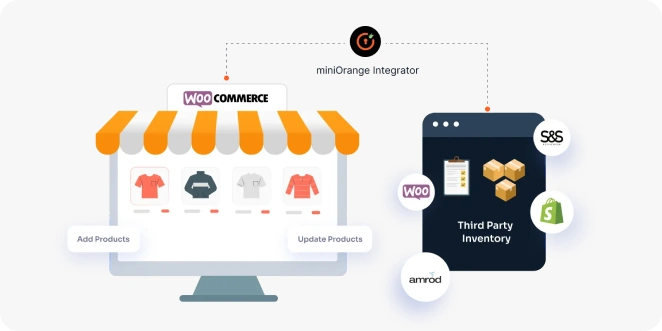What are the risks of traditional supply chains?
Businesses these days want complete information about their purchased shipments, from their origin to their current status. Although traditional supply chains are effective, they pose certain risks that can have a detrimental impact on business operations, profitability, and overall growth. Here are some common risks associated with traditional supply chain solutions:
1) Lack of Transparency: Because traditional supply chain logistics frequently involve several middlemen, it can be difficult to track the movement of goods in real time. This lack of transparency and visibility can result in delays, stockouts, and inventory tracking difficulties.
2) Poor Inventory Management: Managing inventory is critical for logistics and shipping companies. Supply chains with ineffective inventory management can lead to overstocking or understocking, which can result in higher carrying costs or lost sales opportunities. Furthermore, inaccurate data can result in mistakes in order fulfillment and inventory control.
3) Fraud and Counterfeiting: Businesses often experience trust issues while dealing with parties from across borders. Traditional supply chain security is vulnerable to fraud and counterfeiting, especially in sectors where product authenticity is crucial, like pharmaceuticals and luxury goods.
4) Delayed Delivery: Supply chains frequently rely on different forms of transportation, such as trucks, ships, and airplanes. Delays brought on by uninformed weather conditions, heavy traffic, or other unforeseeable events can result in missed delivery deadlines and unhappy customers.
5) Cybersecurity Threats: Traditional supply chain security is susceptible to cybersecurity threats, including data breaches, which can compromise sensitive information and disrupt business operations.
To mitigate these risks, many logistics companies are adopting the latest supply chain security practices, such as implementing blockchain technology, to gain greater visibility, efficiency, and agility in supply chain operations.
Blockchain technology is effective in eliminating supply chain issues related to inventory management and fraudulent activities. It also offers comprehensive visibility into modern supply chain solutions, enabling monitoring and tracing of the user’s complete product journey.
Features of blockchain-based supply chain security by miniOrange
-
Greater Visibility & Transparency: Since blockchain uses a decentralized ledger, transactions and information are consistently recorded across numerous locations. Access to the entire transaction history is restricted to authorized users, greatly reducing the possibility of data breaches.
-
Increased Trust: The traceability and immutability of the blockchain in supply chain make it difficult for counterfeit goods to enter the supply chain undetected. Blockchain's decentralized nature helps build trust by ensuring that data cannot be altered without consensus among participants.
-
Combating Fraud and Illicit Practices: Blockchain emerges as a crucial tool to combat product tampering and waste in supply chain. Since it is a distributed ledger, it becomes almost impossible to tamper with a specific transaction, making its use essential for reducing fraud and illicit practices.
-
Enhanced Traceability: Unlike traditional supply chains, blockchain-based supply chains allow for mapping and visualization of operations like tracking supplier information, purchasing processes, and shipping goods, among other things. This enhances the ability of the supply chain to track specific components.
-
Increased Customer Confidence: By integrating blockchain in supply chain solutions, businesses can give customers detailed information about products, such as their shipping status, which promotes a strong sense of trust. Offering a transparent point-to-point order tracking feature greatly enhances the customer experience.
Popular Applications of Blockchain for Supply Chain Security
1) Logistics Supply Chain
Logistics businesses are always looking for ways to streamline the tracking and delivery of goods. Blockchain technology could help them increase productivity levels and assist supply chains in enabling quicker and more precise delivery processes.
Businesses can also use blockchain to give their customers the ability to track and trace their purchases. This could prevent supply chain issues and ensure product authenticity. Furthermore, blockchain addresses other logistical problems like identifying fake goods, noncompliance, delays, and waste management.
“In May 2023, Ocean Network Express (ONE) announced its partnership with Hong Kong-based blockchain platform Global Shipping Business Network (GSBN) to use blockchain technology to facilitate a secure and trusted exchange of data between different parties across global shipping supply chains.”
Future of Blockchain in Logistics
In the future, blockchain technology will become mainstream in the logistics & supply chain industries as it provides a secure and transparent way to track and manage shipments. The technology will help monitor cargo shipments, aiding companies in refining their operations and enhancing overall efficiency.
2) Food Supply Chain
When it comes to food, customers are most curious about its origin, used ingredients, packaging, storage, shelf life, etc. Increasing cases of food adulteration and the rebranding of expired or counterfeit products have heightened consumer awareness and caution regarding the food they eat. Meanwhile, many food companies face the issue of tracking contaminated food products to prevent the spread of foodborne diseases.
Blockchain is ideally suited to handle these issues due to its dependability and integrity. In the event of a food safety emergency, technology makes it possible to quickly track food products throughout the supply chain. With blockchain in supply chain, companies can have end-to-end visibility of product delivery and can trace unsafe products instantly to stop further product distribution.
“In July 2023, VeChain, a blockchain technology platform, used Internet of Things (IoT) sensors and blockchain technology to monitor the journey of food items from farms to consumers. The technology allows businesses to ensure the authenticity and traceability of their products, as well as food safety and quality.”
Future of Blockchain in the Food Sector
The future of blockchain in food traceability holds enormous potential as the food industry experiences transformative change and adopts new technologies. Blockchain has the potential to reduce the risks associated with foodborne illnesses and illicit food practices. The technology will create a transparent, secure, and efficient mechanism for tracking the movement of food items throughout the supply chain.
3) Pharmaceutical Supply Chains
Pharmaceutical firms are gradually implementing blockchain in supply chain to track the production and distribution of medications worldwide. The technology allows pharma companies to identify the weak points in supply chain solutions that present points for the entry of counterfeit medicines. In addition, the use of blockchain has the potential to address issues with product recalls brought on by errors in labeling, contamination, compromised efficacy, or manufacturing defects in pharmaceuticals.
“In January 2022, Dr. Reddy’s Laboratories announced developing a blockchain solution for cold chain logistics to enable visibility and traceability across the supply chain, improve vaccine delivery, and combat the problem of counterfeit drugs.”
Future of Blockchain in Pharmaceuticals
The pharmaceutical supply chain is poised to make significant strides toward better operational effectiveness, safety, and excellence. A significant change will occur in the way drug-related data is handled and distributed as more pharmaceutical companies adopt blockchain in supply chains. This decision is likely to lead to better patient care and a more reliable and secure healthcare system.
Conclusion
The need for improved transparency, traceability, and efficiency within supply chains will become paramount as industries continue to develop and global trade becomes more complex.
Blockchain technology has the potential to improve supply chain issues by enabling real-time visibility into every step of the business journey, from raw material sourcing to end-user delivery. It has the potential to reshape supply chain management in the future by promoting more robust, open, and responsive international networks.
At miniOrange, we constantly seek to develop secure, cutting-edge solutions to solve our client's specific use cases.
Frequently Asked Questions
1) How does blockchain improve supply chains?
Organizations use blockchain to simplify supply chain management and offer consumers genuine and verified data regarding their purchases.
2) What are the limitations of Blockchain technology in the supply chain?
It is hard to correct a mistake or make any required adjustments to data using Blockchain technology, as it prevents easy alteration of data once recorded. Changing the data would require rewriting the codes in all of the blocks, which is time-consuming and expensive.
3) How is blockchain technology better than traditional supply chain systems?
Blockchain has the potential to provide accurate and real-time supply chain tracking of the complete supply chain process. Organizations can generate a record of every transaction, allowing them to track products from manufacture to delivery to the end-user.
4) What problems does blockchain technology solve in supply chain management?
Blockchain technology allows companies to focus more on manufacturing and less on managing information gaps, and trust issues in the supply chain.
Reach out to us at web3@xecurify.com
Author





Leave a Comment